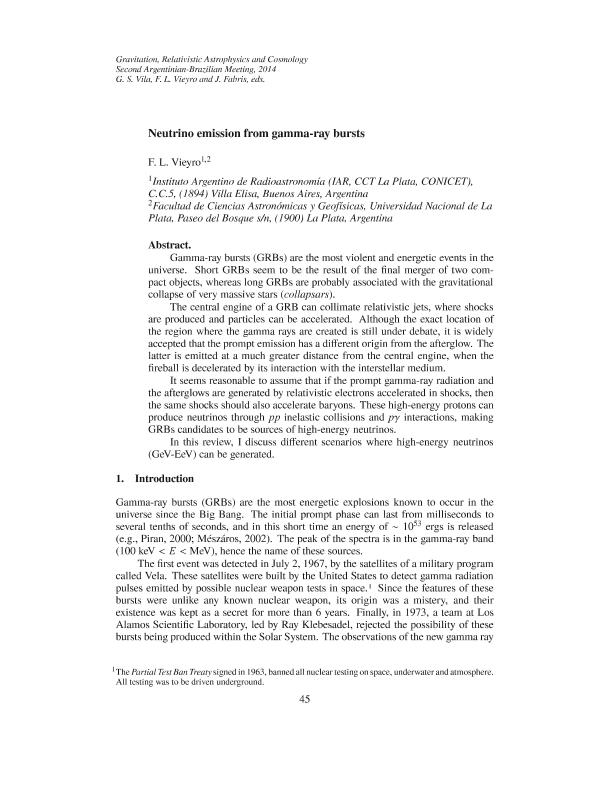Mostrar el registro sencillo del ítem
dc.contributor.author
Vieyro, Florencia Laura

dc.contributor.other
Vila, Gabriela S.
dc.contributor.other
Vieyro, Florencia L.
dc.contributor.other
Fabris, Júlio C.
dc.date.available
2021-09-10T16:51:49Z
dc.date.issued
2015
dc.identifier.citation
Neutrino emission from gamma-ray bursts; Second Argentinian-Brazilian Meeting: Gravitation, Astrophysics, and Cosmology (GRACO); Buenos Aires; Argentina; 2014; 45-54
dc.identifier.isbn
9789872494827
dc.identifier.uri
http://hdl.handle.net/11336/140110
dc.description.abstract
Gamma-ray bursts (GRBs) are the most violent and energetic events in theuniverse. Short GRBs seem to be the result of the final merger of two compactobjects, whereas long GRBs are probably associated with the gravitationalcollapse of very massive stars (collapsars).The central engine of a GRB can collimate relativistic jets, where shocksare produced and particles can be accelerated. Although the exact location ofthe region where the gamma rays are created is still under debate, it is widelyaccepted that the prompt emission has a different origin from the afterglow. Thelatter is emitted at a much greater distance from the central engine, when thefireball is decelerated by its interaction with the interstellar medium.It seems reasonable to assume that if the prompt gamma-ray radiation andthe afterglows are generated by relativistic electrons accelerated in shocks, thenthe same shocks should also accelerate baryons. These high-energy protons canproduce neutrinos through pp inelastic collisions and pγ interactions, makingGRBs candidates to be sources of high-energy neutrinos.In this review, I discuss different scenarios where high-energy neutrinos(GeV-EeV) can be generated.
dc.format
application/pdf
dc.language.iso
eng
dc.publisher
Asociación Argentina de Astronomía
dc.rights
info:eu-repo/semantics/openAccess
dc.rights.uri
https://creativecommons.org/licenses/by-nc-sa/2.5/ar/
dc.subject
Neutrinos
dc.subject
Gamma-ray bursts
dc.subject.classification
Astronomía

dc.subject.classification
Ciencias Físicas

dc.subject.classification
CIENCIAS NATURALES Y EXACTAS

dc.title
Neutrino emission from gamma-ray bursts
dc.type
info:eu-repo/semantics/publishedVersion
dc.type
info:eu-repo/semantics/conferenceObject
dc.type
info:ar-repo/semantics/documento de conferencia
dc.date.updated
2021-08-25T17:41:46Z
dc.journal.volume
7
dc.journal.pagination
45-54
dc.journal.pais
Argentina

dc.journal.ciudad
La Plata
dc.description.fil
Fil: Vieyro, Florencia Laura. Provincia de Buenos Aires. Gobernación. Comisión de Investigaciones Científicas. Instituto Argentino de Radioastronomía. Consejo Nacional de Investigaciones Científicas y Técnicas. Centro Científico Tecnológico Conicet - La Plata. Instituto Argentino de Radioastronomía; Argentina
dc.relation.alternativeid
info:eu-repo/semantics/altIdentifier/url/http://www.astronomiaargentina.org.ar/uploads/docs/graco2_proceedings.pdf
dc.conicet.rol
Autor

dc.coverage
Internacional
dc.type.subtype
Workshop
dc.description.nombreEvento
Second Argentinian-Brazilian Meeting: Gravitation, Astrophysics, and Cosmology (GRACO)
dc.date.evento
2014-04-22
dc.description.ciudadEvento
Buenos Aires
dc.description.paisEvento
Argentina

dc.type.publicacion
Book
dc.description.institucionOrganizadora
Instituto Argentino de Radioastronomía
dc.source.libro
Proceedings of the Second Argentinian-Brazilian Meeting: Gravitation, Astrophysics, and Cosmology
dc.date.eventoHasta
2014-04-25
dc.type
Workshop
Archivos asociados
